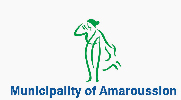
|
||
HIGHLIGHTS OF THE DAY 24 OCTOBER 2014 |
||
CONTENTS: |
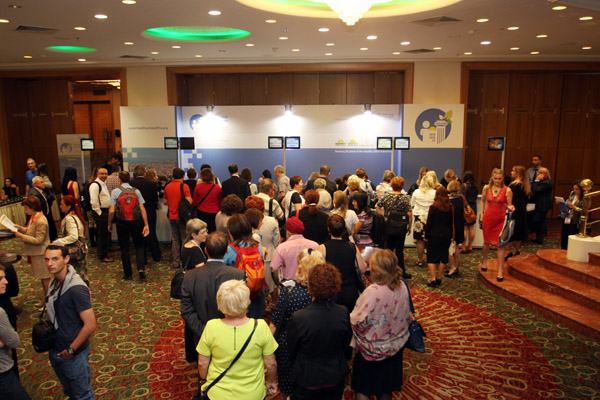
|
|
|
Registration at the conference secretariat on day 1 |
||
DESIGNING HEALTHY CITIES CITY TOURISM AND HEALTHThe morning plenary session included five presentations offering insight into the challenges of the social, economic and environmental elements of design; the economic benefits and addressing the needs of vulnerable population groups within this. |
||
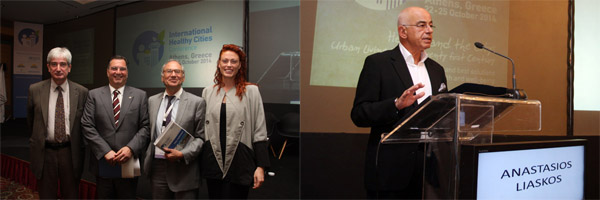
|
||
|
On the left: Speakers of morning plenary session. On the right: Greeting from Anastasios Liaskos. |
||
|
The session was chaired by Pantelis Xyridakis, Mayor, City of Filothei-Psychiko, while Anastasios Liaskos, Secretary-General of the Ministry of Tourism, Greece addressed a greeting to the conference. Keynote speeches were addressed by Johannes Siegrist, Senior Professor for Work Stress Research, University of Düsseldorf, Germany, under the title “Work and health in urban populations - how to reduce vulnerability,” and by Bianca Hermansen, Architect, Urban Designer, Cititek, Copenhagen, Denmark under the title “Designing healthy cities.” Presentations were delivered by Yvonne Doyle, London Regional Director, Public Health England, and Rodd Bond, Programme Director, Netwell Centre, School of Health & Science, Dundalk Institute of Technology, Ireland. |
||
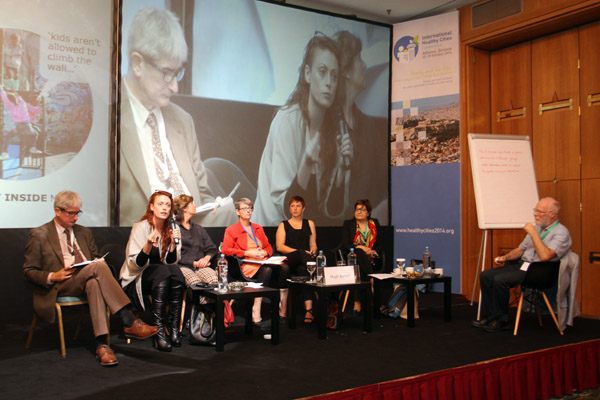
|
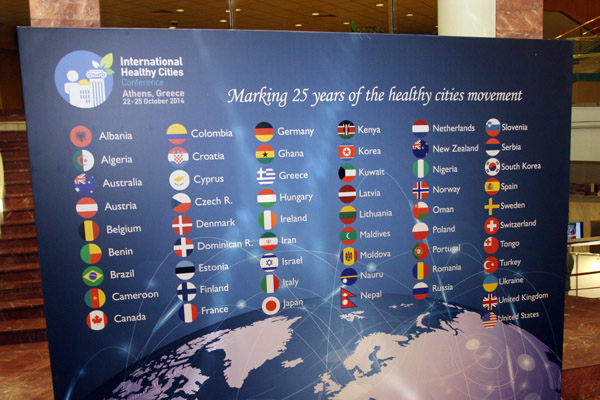
|
|
|
Round-table 10 panel |
Countries participating in the Conference |
OKANA’s representatives, Konstantinos Kokkolis, Evaggelos Kafetzopoulos; Michail Katrinis, Nicoletta Georgala (facilitators); Katerina Micha and Anastasios Panopoulos. |
ROUND TABLE 10: URBAN DESIGN & HEALTHUrban design in this context relates to the design and management of the public realm, neighbourhood design and layout/master-planning. The main purpose was to try to establish whether, in the range of different countries and cultures represented by the panel, there is consensus on what healthy urban design means in practice.As part of that, the panel reflected on the key points made in earlier presentations. In the round-table participated Bianca Hermansen; Gayle Souter-Brown; Rodd Bond; Marianne Dock, and Efi Bekou. Facilitator: Professor Hugh Barton. |
ROUND TABLE 11: PROMOTING HEALTH & SOCIAL INCLUSION IN MULTICULTURAL URBAN SOCIETIESFocusing on sharing different perspectives on promoting health and social inclusion in multicultural societies, the session explored the following questions: How can work and employment serve to help social inclusion and health promotion? What can cities do to foster social inclusion? Who are the key other sectors to involve, apart employment? What are important mechanisms in this? Are there linkages to national and regional levels that are important in promoting this? How can the local level cities bring together different cultures, specifically in relation to different understandings of health and well-being? What can we do to consider these? Table members: Johannes Siegrist; Furio Honsell; Nils Fietje; Marie Connolly, and Kira Fortune.
|
ROUND TABLE 12 ADDRESSING THE ISSUE OF DRUGS IN CITIESThe round-table focused on the revised strategy and the specific programmes implemented by the Greek Organisation against Drugs (OKANA) to address the drugs issue in Greece under the economic crisis. The OKANA’s representatives explored various questions, such as the goals and achievements of the implemented interventions and programmes; the interventions for adolescent and juvenile young users (Atrapos project); the life-saving substitution programmes that should be embraced by the whole of the society; the intervention opportunities for psychoactive substance users not receiving treatment; and OKANA’s treatment interventions in prison settings. |
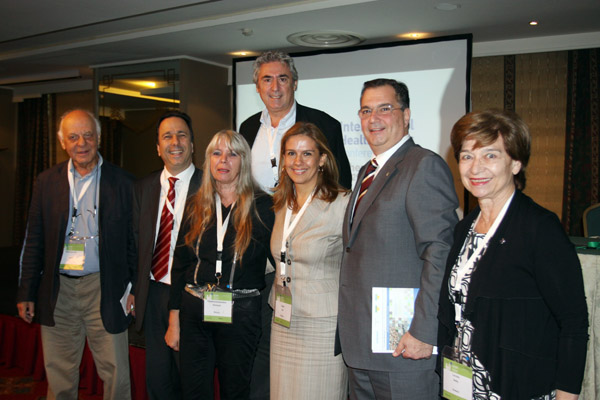
|
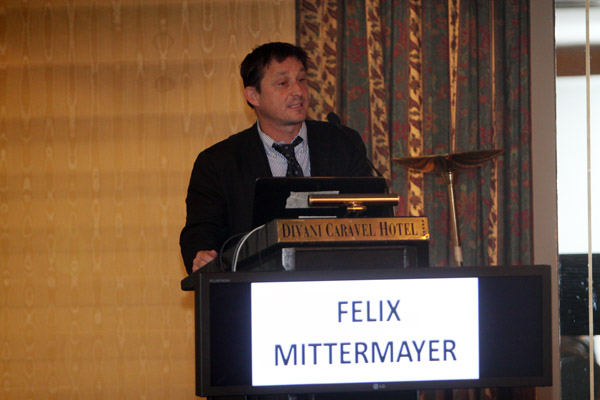
|
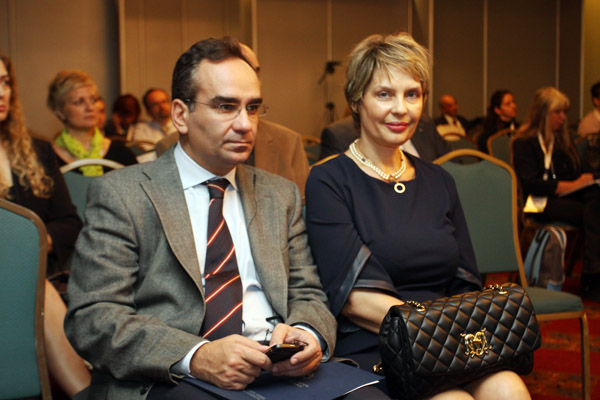
|
|
Aris Sissouras; Sotiris Papaspyropoulos; Dazy Papathanasopoulou; Georgios Makrynos; Zoë Rapti; Pantelis Xyridakis, and Nelly Lavdas. |
Felix Mittermayer, EC, Task Force for Greece |
Vassilis Kontozamanis and Katerina Papakosta. |
EUROPEAN FUNDS FOR THE NEW PROGRAMMING PERIOD 2014 - 2020 OPPORTUNITIES FOR HEALTHY MUNICIPALITIESThe Master class organized by the Hellenic Ministry of Health and coordinated by Zoë Rapti, originated an interesting debate for Greek delegates. Vassilis Kontozamanis, Secretary General, Ministry of Health presented the situation in the Greek health system and the role of structural funds for the necessary reform, while Wim Van Lerberghe, Senior Adviser on Health Systems and Health Reform Support Programme, WHO Europe emphasised the importance of the investment in good primary care made possible with the support of structural funds. European Commission, Task Force for Greece representative Felix Mittermayer, presented the outline of the Partnership Agreement for Programme Period 2014-2020, which was also commented by George Zervos, Hellenic Ministry of Health, who stressed out the need for utilizing cities’ social & health services, under the ministry of Health coordination. Mayor of Philothei-Psychiko, Pantelis Xyridakis emphasized the value of a holistic approach on health by local authorities, the need for modernization and innovative solutions. Brief interventions and commentaries were made among others by the Deputy Minister of Health Katerina Papakosta, Professor Aris Sissouras; Dasy Papathanasopoulou, National Coordinator of the Hellenic Healthy Cities Network; Sotiris Papaspyropoulos, Director of the Hellenic Healthy Cities Network, and Giorgos Makrynos, Vice-President of the Hellenic Healthy Cities Network. |
||
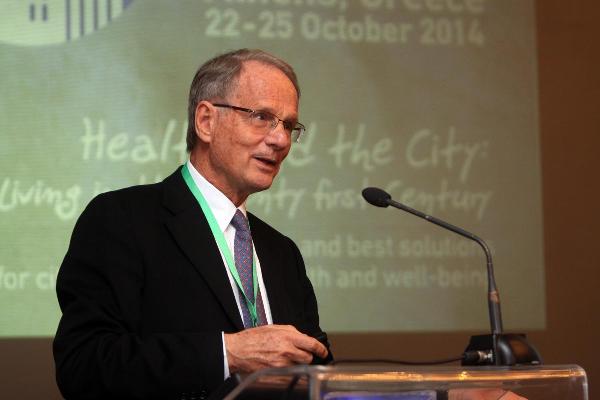
|
||
|
Professor Stephanos Geroulanos |
||
PLENARY SESSION 4 HEALTH AND THE CITY IN ANCIENT GREECEAn enlightening presentation on the History of Medicine was delivered by a man of great passion for history, Mr Stephanos Geroulanos, Surgeon and Professor Emeritus of the History of Medicine, as well as President of the International Hippocratic Foundation. Professor Geroulanos threw new light upon Hippocratic medicine as a catalyst for the evolution of medical science from a primitive reaction to the fear of nature into a solid scientific system. He stressed out how holistic therapeutic approach offered by the “Asklepieia” of antiquity, served as a basis for, and had a strong influence on every aspect of the medical science, from terminology through to endoscopy procedures and surgical instruments. He also referred to the Hippocratic Oath as a landmark of medical ethics which has transformed the medical profession into a mission. |
||
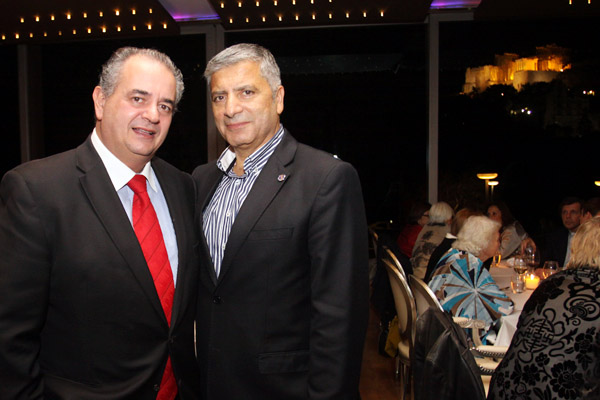
|
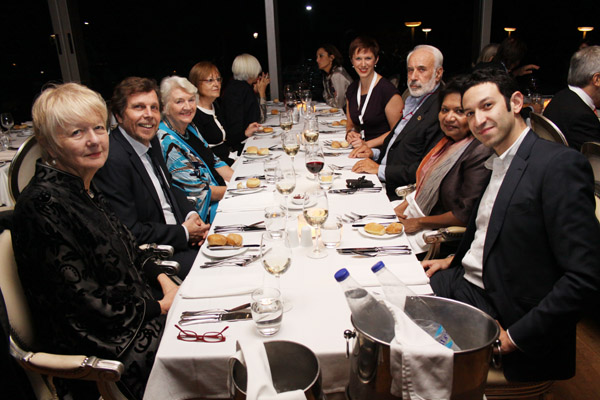
|
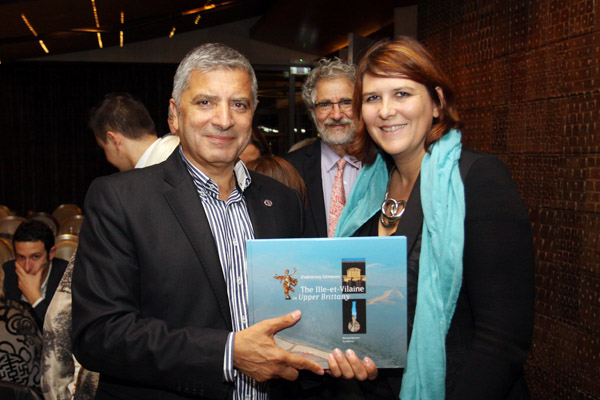
|
|
Panos Livadas, Secretary General of GNTO and Giorgos Patoulis. |
The table of Agis D. Tsouros and WHO officials |
The Mayor of Amaroussion receives a commemorative album |
POLITICIANS DINNERPoliticians’ Dinner was held Thursday evening at “Dionysos” Restaurant, with a panoramic view of the Acropolis. |
||
DO NOT MISS TODAY 25 OCTOBER 2014 |
||
|
On the last day the focus will be on the future of cities, with special themes |
||
1 |
2 |
3 |
|
Morning session starting at 8:30 will discuss smart healthy cities, urban design’s contribution to a “happy city”; also health and well-being. |
The round-table on Greek cities and consequences of the economic crisis on health: examples of resilience and innovative solutions. |
Adoption and signing of the Conference declaration that will take place on the closing session; also the presentation of diplomas for Phase V and presentation of the City Kuopio Finland, host of the 2015 Healthy Cities Conference. |
|
|
||



